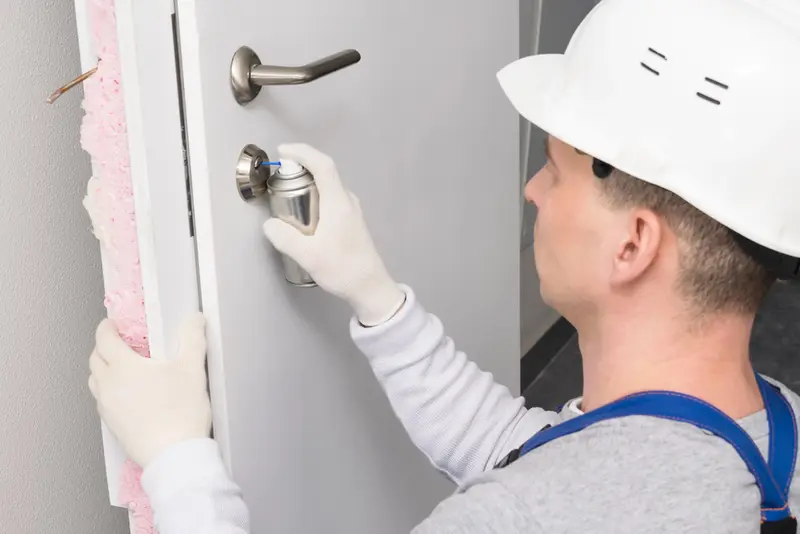Unlock Smooth Operation: The Ultimate Guide to Door Lock Lubrication (and What NOT to Use)

Why Regular Lock Lubrication is Crucial
Door locks, like any mechanical device, require regular maintenance to function properly. Ignoring this simple task can lead to stiffness, sticking, and even complete failure. A properly lubricated lock not only operates smoothly but also enjoys a significantly longer lifespan. This guide will walk you through the do’s and don’ts of lubricating your door locks, ensuring they remain in optimal condition for years to come. Neglecting the maintenance of door locks could lead to more expensive repairs, or even replacement of the entire lock system.
Understanding the Need for Proper Lubrication
Friction is the enemy of any mechanical device. In door locks, the constant movement of pins, cylinders, and levers creates friction, leading to wear and tear. Applying a suitable lubricant reduces this friction, allowing the lock components to move freely and smoothly. Lubrication also prevents corrosion and protects the lock from environmental elements.
Identifying Signs Your Lock Needs Lubrication
- Key is difficult to insert or remove.
- Cylinder feels stiff or resistant when turning.
- Lock makes squeaking or grinding noises.
- Door is difficult to lock or unlock.
The Right Stuff: Best Lubricants for Door Locks
Not all lubricants are created equal. Some lubricants are specifically designed for locks, while others can actually do more harm than good. The key is to choose a lubricant that is dry, clean, and won’t attract dirt and debris.
Graphite Powder: The Classic Choice
Graphite powder is a dry lubricant that has been used for locks for decades. It’s an excellent choice for pin tumbler locks and other mechanical locks because it doesn’t attract dust or grime. It also leaves a protective coating that prevents rust.
- Benefits: Clean, dry, long-lasting, works well in extreme temperatures.
- Drawbacks: Can be messy to apply, not ideal for electronic locks.
- Application: Puff a small amount into the keyway and work the key in and out to distribute the graphite.
Silicone-Based Lubricants: A Modern Alternative
Silicone-based lubricants are another excellent choice for door locks. They are synthetic, dry lubricants that provide excellent protection against friction, corrosion, and moisture. Silicone lubricants are also non-staining and won’t damage plastic or rubber components.
- Benefits: Clean, dry, versatile, suitable for a wide range of locks.
- Drawbacks: Can be more expensive than graphite powder.
- Application: Spray a small amount into the keyway and work the key in and out to distribute the silicone.

The Don’ts:Lubricants to Avoid at All Costs
Using the wrong lubricant can actually damage your locks and shorten their lifespan. Avoid using the following lubricants:
Why WD-40 is a No-Go
While WD-40 is a popular multi-purpose lubricant, it is not suitable for door locks. WD-40 is a solvent-based lubricant that can dissolve existing grease and attract dust and grime. Over time, this can cause the lock to become sticky and even seize up.
- Why it’s bad: Attracts dust, dissolves grease, can cause rust in the long run.
- Alternative: Use a dry lubricant specifically designed for locks.
The Problem with Oils and Greases
Like WD-40, oils and greases can attract dust and grime, leading to buildup and eventual lock failure. They can also become sticky and gummy over time, making it difficult to insert or turn the key.
- Why they’re bad: Attract dust, can become sticky, may damage internal components.
- Alternative: Stick to dry lubricants like graphite or silicone.
Step-by-Step: How to Properly Lubricate Your Door Locks
Follow these simple steps to properly lubricate your door locks:
- Gather your supplies: You’ll need your chosen lubricant (graphite powder or silicone spray), a key, and a clean cloth.
- Clean the keyway: Use a key to gently remove any dirt or debris from the keyway.
- Apply a small amount of lubricant: Puff a small amount of graphite powder or spray a small amount of silicone lubricant into the keyway.
- Work the key: Insert the key into the lock and turn it several times to distribute the lubricant.
- Wipe away excess: Use a clean cloth to wipe away any excess lubricant from the keyway and key.
- Repeat if necessary: If the lock is still stiff, repeat steps 3-5.
Troubleshooting: What to Do if Lubrication Doesn’t Solve the Problem
If lubricating your lock doesn’t solve the problem, there may be a more serious issue at play. Common problems include:
- Damaged or worn-out lock components.
- Misaligned door or strike plate.
- Broken or bent key.
In these cases, it’s best to consult with a professional locksmith. They can diagnose the problem and recommend the appropriate solution.
Prime Locksmith: Your Trusted Locksmith Resource
If you’re experiencing problems with your door locks, or if you’re not comfortable lubricating them yourself, Prime Locksmith is here to help. We offer a wide range of locksmith services to meet your needs, including lock repair, lock replacement, and key duplication.
We are a leading provider of locksmith services. Whether you need emergency lockout assistance, lock repairs, or a complete security system upgrade, we got you covered. Our licensed and insured locksmiths are equipped with cutting-edge tools and technology to handle any lock and key challenge efficiently and effectively.
Our team is dedicated to providing fast, reliable, and affordable locksmith solutions whenever you need them. We pride ourselves on our commitment to customer satisfaction and strive to exceed your expectations with every service we provide.
Conclusion
Regularly lubricating your door locks with the right type of lubricant is essential for maintaining their smooth operation and prolonging their lifespan. Avoid using WD-40, oils, and greases, as they can attract dust and grime and ultimately damage your locks. Instead, stick to dry lubricants like graphite powder or silicone spray. Remember, this is a general guide and we recommend you seek professional help.
This article offers informational advice only. Readers should use this information at their own discretion and risk.
Use the right lock lubricant for long-lasting lock performance. If problems persist, we can help diagnose the cause and provide the best solution.
FAQs: Proper Lubrication of Door Locks (And What Not to Use)
-
Why is regular lock lubrication important?
Regular lock lubrication is crucial for smooth operation, prevents stiffness and sticking, extends the lock's lifespan, and avoids costly repairs or replacements. Friction is the enemy of locks, and lubrication reduces wear and tear and protects against corrosion.
-
What are the signs that my lock needs lubrication?
Signs include a key that's difficult to insert or remove, a stiff cylinder, squeaking or grinding noises when operating the lock, and difficulty locking or unlocking the door.
-
What's the best lubricant to use on my door locks?
The best lubricants are dry lubricants like graphite powder or silicone-based lubricants. They don't attract dirt and debris.
-
How do I apply graphite powder to my lock?
Puff a small amount of graphite powder into the keyway and work the key in and out several times to distribute the graphite.
-
Can I use WD-40 to lubricate my door locks?
No, WD-40 is not suitable for door locks. It's a solvent-based lubricant that dissolves existing grease and attracts dust and grime. This can cause the lock to become sticky and seize up over time.
-
Why are oils and greases bad for door locks?
Oils and greases attract dust and grime, leading to buildup and eventual lock failure. They can also become sticky and gummy, making it difficult to insert or turn the key.
-
What are the steps to properly lubricate a door lock?
Gather your supplies (lubricant, key, cloth), clean the keyway, apply a small amount of lubricant, work the key in the lock, and wipe away any excess lubricant.
-
What if lubricating my lock doesn't solve the problem?
If lubrication doesn't solve the problem, there may be a more serious issue, such as damaged lock components, a misaligned door, or a broken key. In these cases, consult a professional locksmith.
-
How often should I lubricate my door locks?
It depends on usage and environmental factors. If your lock is used frequently or exposed to harsh weather, lubricate it every 6 months. Otherwise, lubricating once a year may be sufficient.
-
Where can I find a trusted locksmith for lock repair or replacement?
Prime Locksmith offers a wide range of locksmith services, including lock repair, lock replacement, and key duplication. Their licensed and insured locksmiths are equipped to handle any lock and key challenge.






